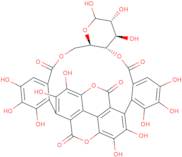
Informação sobre produto
- 2,20,1,23-(Epoxy[2]propene[1,2]diyl[3]ylidene)-11H,15H-tribenzo[g,i,q][1,5,12]trioxacyclononadecin, <span class="text-smallcaps">D</span>-glucose deriv.
- 3,4,5,11,12,13,21,22,23,26,27,38,39-Tridecahydroxy-9,14,17,29,36-Pentaoxaoctacyclo[29.8.0.02,7
- <span class="text-smallcaps">D</span>-Glucose, cyclic 4,6-[(2S,2′S)-2,2′-(5,10-dihydro-2,3,7,8-tetrahydroxy-5,10-dioxo[1]benzopyrano[5,4,3-cde][1]benzopyran-1,6-diyl)bis[3,4,5-trihydroxybenzoate]]
- [1]Benzopyrano[5,4,3-cde][1]benzopyran, <span class="text-smallcaps">D</span>-glucose deriv.
Punicalin is a natural product that has been shown to be a potent anti-inflammatory agent. It has been shown to inhibit the production of cyclin D2, which is associated with the development of atherosclerotic lesions. Punicalin also induces autophagy and inhibits oxidative injury in mouse tumor cells. Punicalin has been shown to have antibacterial efficacy against gram-positive bacteria (e.g., Bacillus subtilis) and gram-negative bacteria (e.g., Escherichia coli). It can also be used for the treatment of infectious diseases such as tuberculosis or bacterial sepsis, which are characterized by high levels of oxidative stress. Punicalin has been shown to have a number of physiological effects, including an increase in liver glycogen content and blood sugar levels, as well as inhibiting gsh-px activities in rat liver cells.
Propriedades químicas
Consulta técnica sobre: 3D-FP74109 Punicalin
Se desejar solicitar um orçamento ou fazer uma encomenda, por favor, adicione os produtos ao seu carrinho e depois solicite um orçamento ou encomenda a partir do carrinho. É mais rápido, mais barato e poderá beneficiar-se dos descontos e outras vantagens disponíveis.





